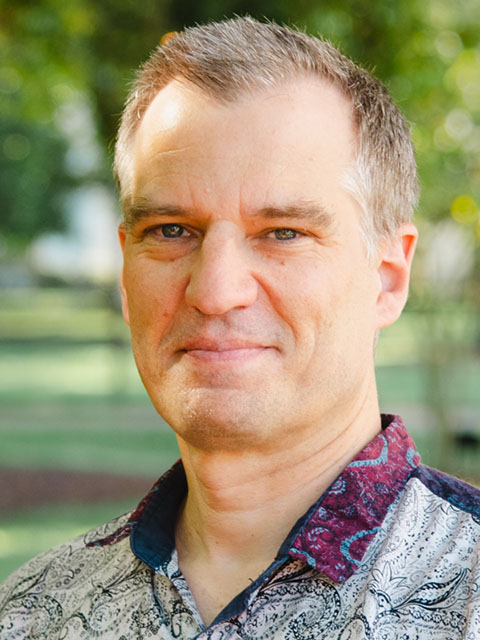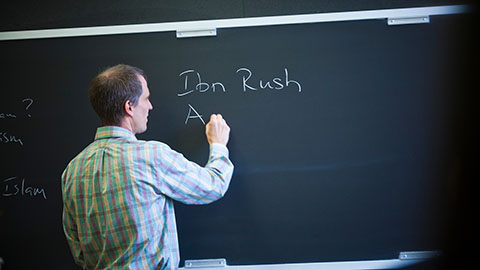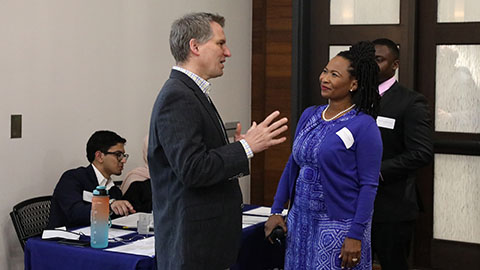Faculty Spotlight: Florian Pohl

Florian Pohl has been an active mentor and teacher, encouraging Oxford students to find connections across disciplines and see how their studies play out in the real world.
Over the last 15 years, Florian Pohl has done much to shape Oxford; in that time, Oxford has also shaped him.

Pohl, Associate Professor of Religion, has involved students in his own research and helped expand the curriculum: He was instrumental in the implementation of Oxford's Ways of Inquiry program, which requires students to take courses that explore how different disciplines view the world. He has also tailored his work on Islamic studies to include and encourage student participation, both in the classroom and the world beyond.
Pohl's path to Oxford, where he's been since 2007, starts with his upbringing in Germany. He began his academic career studying Protestant theology—then, a one-year exchange program at Temple University in Philadelphia introduced him to inter-religious approaches, leading him to get involved in Jewish and Islamic studies. When he went back to Germany, he and other academics began to establish an interfaith program for teaching religion in high schools, working predominantly with Germany's large Turkish Muslim population.
"That led me to have a greater interest in preparing myself to be a sensitive conversation partner in those endeavors," he said of an academic focus that began to involve matters of communal activism and religious education—ideas he'd later explore with Oxford students.
Soon after, he was back in the United States for his PhD at Temple, where he began to focus on Islamic educational practices in Indonesia, "how Muslim schools, particularly traditional schools, were very much public actors, and not always ones that closed down the opportunity for progressive politics, but rather enabled them."
As he looked for a teaching position, it was clear to him Oxford was the right fit when, on his visit, then-Chaplain Judy Shema arranged a lunch with students from the Interfaith Council.
"I found the conversation indicative of a student body that had great ownership over who the faculty is, what they do, how accessible they are, and how they would serve student interests," he said. "And I found that incredibly invigorating to see this kind of student ownership reflected in that maybe 45-minute meeting, and also that there was an incredible religious diversity on campus—a vibrant kind of inter-religious life."

Pohl was soon engaging with this community as a professor. He has always considered himself a "teacher-scholar" who "puts the teacher first." The Ways of Inquiry program, he said, allowed him to push those ideas around teaching to a new level and encourage students to "go beyond the limits of individual disciplines to see interdisciplinary connections, to get them comfortable with complex problems where they can't always find one definite right answer."
"Those were some of the most meaningful conversations today that I've had with colleagues— around innovative teaching, about how to serve our students in ways that are meaningful in and outside of our disciplines," he said.
"Florian is a supportive, encouraging colleague who brings fierce intelligence and a wonderful sense of humor to every conversation and interaction," said Molly McGehee, Associate Dean for Faculty Development and Associate Professor of English and American Studies. "His positivity, calm demeanor, sincere appreciation for and investment in engaging with a diversity of cultures and ways of thinking, and his work within the broader community are admirable. It's an honor to work alongside such an impressive scholar-teacher-friend."
Pohl has been providing opportunities for hands-on projects in his own religious studies courses, designing research projects around Islam in the public sphere right here in Georgia. He and his students have created a digital archive on cases that have been filed against building projects for Islamic sites like cemeteries and mosques across the country.
A fair number of these sites have been in the Atlanta area, and that was inspiration enough to bring their scholarship out into the world: Partnering with local Newton County and Atlanta Muslim community members, his students began collecting oral histories about the controversy. He has also taken them to Friday worship services where they were able to engage with members of the community.
Stewart Zelnick 20Ox 22C took a particular interest in the digital archive project and continued to work with Pohl through the Summer Undergraduate Research Experience (SURE) program. As he was interested in law, Pohl encouraged Zelnick to focus on cases that specifically appealed to the Religious Land Use and Institutionalized Persons Act. The two continued to work together after Zelnick transitioned to Emory, and they are currently working to jointly publish a piece on their findings.
"Throughout the research process, Dr. Pohl has been an excellent mentor," Zelnick said. "Not only has he taught me about professionalism and owning my research, but he has also helped me to form important habits that are useful to the research process. He has helped me to set attainable goals and answered every question—and there were many—that I have had about research."

Florian Pohl with Amanda Copeland-Phillips, who as a student at Oxford founded the MSA in 1991.
This year, Pohl has started a new project alongside Oxford's Muslim Student Association (MSA) to archive their long history on campus, of which to date there has been no official and permanent historical record. The MSA celebrated their 30th anniversary this year, and Pohl's Islam in America class has started putting together the archive, doing oral history interviews with members who have gone through the association over the years. The goal, he says, is to complete the project and eventually hand it over to the MSA and the Oxford Library, continuing to work with both in an advisory role.
These involved, hands-on, and community-oriented experiences are at the center of Pohl's teaching. He wants his students actively participate in their learning and to better understand the world and the people in it—to cultivate approaches that will help students whether they remain in religious studies or not.
These experiences are important, he said, because they "check the simplified—often for good reason—ways in which our textbooks talk about the world in distinct chapters that are separate from each other. They allow students to experience the messiness and complexity of the real world and to hear insiders articulate things quite differently from the ways in which we read about them."
And it's at that intersection, according to Pohl, where the real learning takes place.